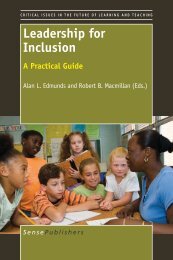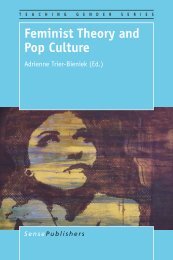CHANGING OUR MINDSat the epistemological level, calling upon learners to ‘change their minds,’ not bysupplanting what they know, but by transforming how they know. Furthermore,that learners respond to discrepancies in different ways, that is, by avoidance,assimilation, or, as we shall see, by accommodation (integration), suggests thatthere may exist highly individual reasons determining responses to <strong>threshold</strong><strong>concepts</strong>, reasons such as alternative commitments <strong>and</strong> readiness for change.Finally, given the affective nature of these changes, our task as educators is toacknowledge the difficult journey on which we are asking students to embark. Wemay thus envision ways of foreshadowing for students the impending sense of loss<strong>and</strong> help them to live more comfortably with their discomfort.TRANSFORMATIVENESS, OR, ON OPENING UP OF EPISTEMOLOGICAL,CONCEPTUAL, AND AFFECTIVE SPACESKegan (1982) notes that epistemic doubt may indeed lead one to ‘the limits of[one’s] ways of knowing the world’ (p. 59), <strong>and</strong>, as we have seen, this may causesome learners to temporarily arrest their epistemic development. Yet, is this theresponse of most learners? Perry (1981) remarks that it is not. The response toepistemic doubt caused by troublesomeness may also take the form of actiontowards change, action marking the beginning of the transformative process, actionwhich may ‘open[…] up a new <strong>and</strong> previously inaccessible way of thinking aboutsomething’ (Meyer <strong>and</strong> L<strong>and</strong>, 2003, p. 1).The idea of ‘opening up’ new ways of thinking is captured in the work of manyresearchers interested in <strong>learning</strong>. Baltas (2007) characterises the disclosure ofbackground ‘assumptions’ in conceptual change as ‘widen[ing] up <strong>and</strong> modify[ing][…] the […] space available to inquiry’ (p. 65). In their exploration of professors’developing conceptions of teaching, Entwistle <strong>and</strong> Walker (2002) characteriseprofessors’ sophisticated, <strong>learning</strong>-centred conceptions of teaching as ‘lead[ing] toan exp<strong>and</strong>ed awareness – seeing additional goals for teaching <strong>and</strong> <strong>learning</strong> whichwere originally not perceived explicitly at all’ (p. 17). Kegan (1994) eloquentlynotes thattransforming our epistemologies, liberating ourselves from that in which wewere embedded, making what was subject into object so that we can ‘have it’rather than ‘be had’ by it – this is the most powerful way I know to conceptualizethe growth of the mind. (p. 34)We may therefore begin to envision that the transformative process involves notonly the expansion of epistemological <strong>and</strong> conceptual spaces, but also, as Meyer<strong>and</strong> L<strong>and</strong> (2005, 2006) explain, the expansion <strong>and</strong> transformation of identity, ofa learner’s ‘sense of self ‘ (2006, p. 19). We must also consider that this processof transformation, <strong>and</strong> hence movement within these liminal spaces, is notunidirectional, yet may ‘involve oscillation between stages, often with temporaryregression to an earlier status’ (Meyer <strong>and</strong> L<strong>and</strong>, 2005, p. 376). Boyd <strong>and</strong> Myers(1988) speak of the ‘oscillating movement […] from disorganization to despair’(p. 278) that characterises this phase of grieving in the process of <strong>transformational</strong>11
TIMMERMANSeducation. Berger (2004) characterises <strong>transformational</strong> spaces as ‘precarious’, <strong>and</strong>Kegan (with Scharmer, 2000) describes entering into a transitional space as feelingmuch ‘like going off a cliff ‘ (p. 11).Yet, when st<strong>and</strong>ing on the edge of a cliff (or a <strong>threshold</strong>), might some learnersfeel terror, while others feel exhilaration? Stated otherwise, ‘Does this liminalspace feel the same for everyone?’ In her thought piece entitled ‘Dancing on theThreshold of Meaning: Recognizing <strong>and</strong> Underst<strong>and</strong>ing the Growing Edge,’Berger (2004) suggests that it might not. She recounts the stories of two women,Kathleen <strong>and</strong> Melody, both facing times of profound transition in their lives.Kathleen is ‘excited […] <strong>and</strong> not knowing about her future leaves her filled withpossibility <strong>and</strong> hope’ (p. 341). Melody, on the other h<strong>and</strong> is both ‘frighten[ed]’ <strong>and</strong>‘unhappy’ (p. 342) in this space of transformation. Berger’s (2004) account ofthese two women, one who embraces the period of transition, <strong>and</strong> the other whoretreats from it, provides evidence of a ‘complex continuum’ (p. 343) of emotionalresponses to the liminal space.As we saw earlier, underlying this complex variation of individual responsesmay be issues of alternative commitments <strong>and</strong> readiness for change. What theseissues may signal, in fact, is variation in learners’ current ways of making meaning.Perry’s seminal study entitled the ‘Intellectual <strong>and</strong> Ethical Development of CollegeStudents’ (1970) originated in an attempt to account for the variations he hadobserved in the ways in which college students were responding to the ‘thepluralistic intellectual <strong>and</strong> social environment of the university’ (Hofer <strong>and</strong> Pintrich,1997, p. 90). What Perry ultimately showed was that different responses to externalconditions could be attributed to individual differences in learners’ epistemicbeliefs. That some learners ‘open up,’ while others clearly get ‘stuck’ (Meyer <strong>and</strong>L<strong>and</strong>, 2005, p. 380), may signal to us as educators that the epistemological transitionbeing instigated by a <strong>threshold</strong> concept lies beyond the learner’s zone of proximaldevelopment (Vygotsky, 1978). That is, it lies too far beyond what the learner mayachieve when guided by more skilful others. These variations in response to teachingcaution us to be attuned to variations in the ways that learners are making meaning.12IRREVERSIBLITY, OR, ON CROSSING THRESHOLDSBerger (2004) notes that “Bridges (1980) described as the hardest piece of transformationthe ‘neutral zone’ when the past seems untenable <strong>and</strong> the future unidentifiable”(p. 343). That the past seems unreachable, suggests that the there is a timein the transformation process when the individual crosses a <strong>threshold</strong>.The Oxford dictionary defines that a <strong>threshold</strong> ‘symbolically […] marks theboundary between a household <strong>and</strong> the outer world, <strong>and</strong> hence between belonging<strong>and</strong> not-belonging, <strong>and</strong> between safety <strong>and</strong> danger’ (Simpson <strong>and</strong> Roud, 2000) <strong>and</strong>consequently between the former world <strong>and</strong> the new world. In biology, a <strong>threshold</strong>indicates the minimum, yet critical level a stimulus must attain to ‘produce excitationof any structure‘ (Therxold, 2000). Thus interpreted, the inherent troublesomenessof <strong>threshold</strong> <strong>concepts</strong> may provide the impulse that ‘excites’ an individual <strong>and</strong> leadsto the type of action that carries him/her across a <strong>threshold</strong> towards epistemologicaltransformation.
- Page 1 and 2:
EDUCATIONAL FUTURES: RETHINKING THE
- Page 3 and 4:
EDUCATIONAL FUTURESRETHINKING THEOR
- Page 5 and 6:
A C.I.P. record for this book is av
- Page 7 and 8: TABLE OF CONTENTS10. Threshold Conc
- Page 9 and 10: Pax Intrantibus Salus Exeuntibus. L
- Page 11 and 12: LAND ET ALstudents experience diffi
- Page 13 and 14: LAND ET ALModePreliminalLiminalPost
- Page 15 and 16: LAND ET AL(Barker, 1991, p.184). Th
- Page 17 and 18: LAND ET ALvariations arising from t
- Page 19 and 20: LAND ET ALform of a model of concep
- Page 21 and 22: LAND ET ALQuestions of intersection
- Page 24 and 25: EDITORS’ PREFACEstudents bring to
- Page 26 and 27: EDITORS’ PREFACEconcepts in the f
- Page 28 and 29: EDITORS’ PREFACEIn the final illu
- Page 30 and 31: EDITORS’ PREFACEhence becomes a n
- Page 32 and 33: EDITORS’ PREFACElearning. This th
- Page 34 and 35: EDITORS’ PREFACEa lens or ‘way
- Page 36 and 37: EDITORS’ PREFACEHence learning is
- Page 38 and 39: EDITORS’ PREFACEthe Communitas, w
- Page 40 and 41: EDITORS’ PREFACEBuilding on these
- Page 42 and 43: EDITORS’ PREFACECousin, G. (2009)
- Page 44 and 45: DAVID PERKINSFOREWORDEntrance…and
- Page 46: FOREWORDMeyer, J.H.F., Land, R. & D
- Page 50 and 51: JULIE A. TIMMERMANS1. CHANGING OUR
- Page 52 and 53: CHANGING OUR MINDSKegan’s (1982)
- Page 54 and 55: CHANGING OUR MINDSKegan describes e
- Page 56 and 57: CHANGING OUR MINDSIn fact, Kegan an
- Page 60 and 61: CHANGING OUR MINDSMight a learner r
- Page 62 and 63: CHANGING OUR MINDSreveals an additi
- Page 64 and 65: CHANGING OUR MINDSBendixen, L. D.,
- Page 66: CHANGING OUR MINDSSibbett, C., & Th
- Page 69 and 70: SCHWARTZMANScholarship in liminalit
- Page 71 and 72: SCHWARTZMANTC: the entityThe term T
- Page 73 and 74: SCHWARTZMANA resource for teaching
- Page 75 and 76: SCHWARTZMANunprecedented to attract
- Page 77 and 78: SCHWARTZMANspectrum of scholarship
- Page 79 and 80: SCHWARTZMANrupture and phenomenolog
- Page 81 and 82: SCHWARTZMANfield(s) of one’s cons
- Page 83 and 84: SCHWARTZMAN36DATA: PARTICULARS GIVI
- Page 85 and 86: SCHWARTZMANchallenge than interpret
- Page 87 and 88: SCHWARTZMANStrategies for Teaching:
- Page 89 and 90: SCHWARTZMANThey are redefined here
- Page 91: SCHWARTZMANLoder, J. (1981). The tr




